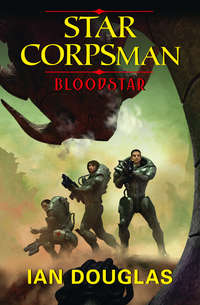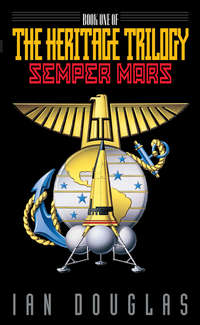
Полная версия
Star Corps
He considered overriding the cutouts and bringing the camera down. Troops in the field had the right to do so if a wandering news camera might reveal positions or movements to the enemy. In fact, the mullahs across the Nile in Cairo were probably watching live Triple N news coverage at that moment. He resisted a comic-relief impulse to wave.
Still, the networks were generally pretty good about keeping their equipment back from the immediate front lines, if only because those flying robotic eyes were damned expensive and tended to draw fire. If newsies were around, it was a good sign that the enemy wasn’t. Anyway, the one he’d seen was traveling at a pretty good clip, heading toward the river. He let it go.
Warhurst returned his attention to the Sphinx once more. After a moment’s thought, he slung his weapon, then reached up and unsnapped the catches on his combat helmet. He wanted to see that ancient wonder with unaugmented eyes.
The light surprised him and made him blink. The sky was bright and pale blue, only minutes from sunrise. The Sphinx continued to stare at the eastern horizon, as though patiently waiting for yet another in a chain of three million dawns.
He turned then, facing west, and caught sight of a glorious panorama—the three pyramids rising above the Giza Plateau; the nearest, Khafre’s, just two hundred meters away. The upper half of each glowed a brilliant orange-yellow, bathed in light from a sun still below the horizon; the lower halves were still gray with night shadow.
Soldiers! Forty centuries look down upon you! So, it was said, Napoleon had addressed his men in 1798, just before the Battle of the Pyramids. Those enigmatic, artificial mountains had seen more than their share of blood upon the sand already.
Stuttering automatic gunfire punctuated that thought. It sounded like Cooper and Third Platoon were slugging it out with the locals near the base of Khufu’s pyramid. He could hear the radio chatter in his earclip speaker.
“Shooters! Shooters on the pyramid, north side!”
“Roger that. I’ve got ’em.”
“Haley! Wokowski! Circle left!”
“North side clear!”
The fighting was dying down … but this had only been the opening round. The angry mobs occupying the Giza Plateau had retired as usual last night to the comfort and security of Cairo, north and across the Nile, but they would be back as soon as they realized that the UFR/USA had intervened in the crisis militarily, and they would have Mahdi Guards and crack Saladin with them. The Marines had seized the plateau just west of the Nile; now they would have to hold it.
Warhurst didn’t know why the Marines were there, and frankly, he didn’t care. Scuttlebutt had it that KOA was threatening to shut down the archeological digs in and around Giza and evict all foreign xenoarcheologists, but the premission briefing had stressed only that hostile forces in the area around the Sphinx and the Great Pyramids—including both regular troops and large numbers of poorly armed militia—were threatening vital American interests in the region and needed to be neutralized … without causing collateral damage to the monuments, archeological digs, and foreign personnel in the area. The three TAVs bearing First, Second, and Third Platoons of Bravo Company, 3rd Marines, had lifted off from Runway Bravo at Camp Lejeune just forty minutes ago, traversing the Atlantic south of Greenland on a great circle suborbital flight that had brought them down over Egypt. More troops—2nd Regiment’s Alfa, Charlie, and Delta Companies—were on the way; Bravo Company was tasked merely with clearing the LZ and securing the perimeter.
He hoped the relief force came fast. Right now they were terribly exposed—eighty-four Marines, twelve lightly armored CPCs, and three TAVs, holding a few hundred hectares of sand and stone monuments that just hours ago had been swarming with screaming, religious-fanatic mobs.
And those mobs would be back. Guaranteed.
In the east the sun flared above the flat horizon, an explosion of golden light illuminating the dunes and casting long, undulating shadows that filled each depression and indentation in the sand. Warhurst settled his helmet back over his head, resealing the latches.
The counterattack, when it came, would come soon and from the direction of Cairo, fourteen kilometers to the northeast.
Esteban Residence
Guaymas, Sonora Territory
United Federal Republic, Earth
1055 hours PT
John Garroway Esteban relaxed in the embrace of his sensory couch, opening himself to the images flooding through his mind. Gunfire snapped and crackled in the distance, as a mob of swarthy men in a mix of military uniforms and civilian clothing swarmed across a bridge, some in trucks or cargo floaters, most on foot. The news anchor’s voice-over described the scene as data windows opened with sidebar data. live from cairo floated in blue letters above the confused and chaotic panorama.
“Demonstrations began in Cairo three days ago,” the anchor was saying, “when the Mahdi declared that the monuments of Giza existed to declare God’s glory and that attempts to excavate them in order to prove extraterrestrial influences in ancient human affairs were blasphemous and, therefore, illegal under the religious laws of the Kingdom of Allah. All archeological excavations in Egypt were ordered halted when—”
With a focused thought, John shifted feeds. Show me the Marines.
It felt as though he were drifting above the desert. It was mid-morning, and men in chamelearmor almost indistinguishable from the sand around them crouched in holes scratched into the shelter of a dune. Robot sentries, solitary pylons capped by laser turrets, scanned the horizon, as an American flag fluttered in the breeze from a makeshift pole. In the background the scarred and age-smoothed face of the Sphinx looked over the desert, and behind it rose the golden apex of one of the pyramids. A velvet-black, stub-winged aircraft circled overhead. “Silim,” he whispered, an Ahannu word currently in vogue with the xenophilic set, meaning “good” or “with it.”
“Just before dawn this morning,” the narrator said, “elements of the 3rd Marine Division were suborbited into Giza, neutralizing local forces and setting up a defensive perimeter, establishing what President LaSalle called ‘a safe zone to protect both American and Confederation interests in the region.’”
For minutes more, he took in the scenes relayed from the battlefield, views of American Marines crouched under cover, of robotic fliers patrolling sandy wastes, of a team of Confederation archeologists debarking from a transatmospheric lander and being escorted by Marines to the base of the Great Pyramid.
The scene blurred and shifted, and John found himself sitting in a folding chair in the White House Rose Garden. President LaSalle stood behind a podium a few meters away, her face drawn and tired, as though she’d been up all night. “One of my predecessors,” she said, “called the U.S. Marines the Navy’s police force. In fact, for the past 150 years they have been the President’s police force, the first of this nation’s military forces to be deployed to any spot on the globe where our vital interests are being threatened. I did not make the decision to deploy our young men and women to this region lightly. Ongoing excavations at Giza are in the process of uncovering remarkable discoveries of inestimable value in understanding our past and the nature of repeated extraterrestrial interventions upon this world of ours thousands of years ago. It is vital to all of us that these discoveries remain intact, that they not fall into the hands of radical religious extremists. …”
For John, it was as though he were sitting right there with the reporters, listening to the President’s speech. The clarity and realism of the noumen’s sensory input were nearly as sharp as real life. His implant was an expensive, high-end set, with almost two thousand protein processor nodes grown from microscopic nanoseeds scattered throughout his cerebral cortex and clustered within the nerve bundles of the corpus callosum. His father had insisted on a top-of-the-line Sony-TI 12000 Series Two Cerebralink, complete with social interactive icon selection, high-speed interfaces, emotional input, and multiple net search demons, and for once John was happy that his father was who and what he was, able to pull that much thrust. The 12000 was an executive model, the sort of cranialink nanohardware favored by high-powered CEOs and techers, light-years beyond what the other kids had had for schoolinks.
John was eighteen and well into his first year of online university work. Carlos Jesus Esteban was determined that his son would get his degree in business management. John knew that his father might differ with him about his future career, but at least—
A yellow light winked against the upper right corner of the news window in John’s mind. Shit!
He mindclicked the link, closing the window, but the warning program he’d written for his Sony-TI simply wasn’t fast enough to beat the parental insertion. The window froze before it collapsed completely, then expanded again to show President LaSalle caught in foolish-looking mid-word.
His father’s noumetic icon exploded into his consciousness, a mustached giant, vast and stern, in violet business smartsuit, with lightning flickering about his brow. “What the hell are you doing?” The elder Esteban’s voice was like thunder, and John, out of long-polished habit, cringed, then flared back.
“This is my feed!”
“You think so, smart kid? I bought you that fancy nanoware, and I won’t have you nouming that damned political pornography. Not as long as you’re in my house!”
The image of President LaSalle winked out, and John floated alone in cyberspace with his father. He tried to adjust his own icon presentation so he felt less like a tiny satellite orbiting a planetary giant, but he found the mental input controls beyond his reach. His father was running his noumenal feed now.
Pretty soon I’ll be able to noum what I want to. The thought came to mind unbidden.
Somehow—could his father do that?—Esteban caught the thought or its echo. “What do you mean by that crack?” his father said. “Where do you think you’re going?”
John felt the shifting cybercurrents of moving data packets. Damn! His father was sifting through his files. If he found out—
“What are you hiding, muchacho? Huh? What do you have in here?”
Abruptly, desperately, John mindclicked and severed the link. He sat once again in his sensory couch, the familiar surroundings of his home E-room around him. He lay there for a moment, breathing hard. Damn, damn, damn his father! These encounters always left him shaking, weak, and feeling violated. Just because his father felt that he had the right to monitor everything that he did on the net …
Sometimes that translated as the right to monitor everything that he thought, and to John, that blatant invasion of privacy, self, and boundaries was as personal and as direct as a slap across the face.
If his father was angry at him for following Triple N’s coverage of the Egyptian crisis, he would have been absolutely furious to learn that in a few days’ time his son would be leaving home for good.
Tough, he thought. John Garroway Esteban had been a free agent since turning eighteen three months ago. For much of his life he’d dreamed about being a Marine, ever since his mother had told him about her ancestors, the Garroways, and the roles they’d played in wars from Korea to Mexico.
Soon he would be a Marine himself, and he could kick off the mud of this damned planet and begin to see the worlds.
Silim! …
Marine Planetary Base
Mars Prime, Mars
1914 hours Zulu
Some 210 million kilometers from John Esteban’s E-center musings, Colonel Thomas Jackson Ramsey—“TJ” to his friends—touched the announce pad at the doorway to the office of his commanding officer. The door slid open in response. “General Cassidy? Reporting as ordered, sir.”
“Enter,” William Cassidy said without looking up from his work station.
Ramsey entered, centering himself on the hatch, hands clasped stiffly at his back. He didn’t know why he’d been summoned here. He didn’t think he was in trouble, but with Brigadier General Cassidy—a tough, no-nonsense character with dark mahogany skin, silver hair, and a hard-ass attitude reputed to curdle milk at fifty meters—you never knew.
“At ease, at ease,” Cassidy said after a moment. He pulled the link circlet from his head and tossed it aside on the desk, then rubbed his eyes. “Drag up a chair.”
Ramsey floated a glider chair across the deck and anchored it with a thought. “You wanted to see me, sir?”
“Yes, damn it. You’ve got new orders.”
Ramsey’s eyebrows lifted themselves toward his hair line. “Sir? I’ve only been here eight months.” The usual length of off-world deployments was two years.
“I know. And I’m going to hate like hell to lose you.” Cassidy gave him a sidelong look. “What’s your famsit?”
Curiouser and curiouser. A Marine’s family situation was only raised for offworld deployments. “No current contract, sir. I had one before I shipped out for Mars.” Cheryl hadn’t been willing to wait for him, and he couldn’t say he blamed her. It still hurt, though. …
“Any kids?”
“No, sir. Do I take it that I’m being reassigned out-Solar, General?”
“I guess you could say that. It’s volunteers only, and it’s long term. Very long term. But it’s carrying a Career Three.”
“Goddess! Where are they sending me?”
“That,” Cassidy said, “is classified. They won’t even tell me. But they want you back on Earth so they can talk to you about it. Open up and I’ll pass you what I have.”
Ramsey uplinked to the local netnode with a coded thought and tuned to the general’s channel. Information flickered through his awareness, resolving itself into stark words hanging before his mind’s eye. There wasn’t much.
FROM: USMCSPACCOM, QUANTICO, VIRGINIA
TO: THOMAS JACKSON RAMSEY, COLONEL, USMC HQ DEPOT USMC MARS PRIME
FROM: DWIGHT VINCENT GABRIOWSKI, MAJGEN, USMC
DATE: 2 JUN 38
SUBJ: ORDERS
YOU ARE HEREBY REQUIRED AND DIRECTED TO REPORT TO USMCSPACCOM WITH YOUR COMMAND CONSTELLATION, DELTA SIERRA 219, FOR IN-PERSON BRIEFING AND POSSIBLE VOLUNTARY REASSIGNMENT.
THE IP PACKET OSIRIS (CFT-12) WILL BE MADE READY TO TRANSPORT COMMAND CONSTELLATION DELTA SIERRA 219 TO USMC SPACEPORT CAMP LEJEUNE, DEPARTING MARS PRIME NO LATER THAN 1200 HOURS LT 3 JUNE 2138, ARRIVING CAMP LEJEUNE SPACEPORT NO LATER THAN 9 JUNE 2138.
OFFERED MISSION REQUIRES FAMSIT CLASS TWO OR LOWER. RECENT CHANGES IN INDIVIDUAL FAMSITS SHOULD BE UPLINKED TO USMCSPACCOM PRIOR TO SCHEDULED DEPARTURE.
OFFERED MISSION ASSIGNMENT CARRIES CAREER THREE RATING.
SIGNED: D.V. GABRIOWSKI
This, Ramsey reflected, would not be an ordinary duty reassignment. Career Three meant a big boost to his career track … the equivalent of a major combat-command assignment or a long-term independent command, possibly both. The famsit requirement could only mean a long deployment, a couple of years at least.
Where the hell were they sending him, Europa?
Which reminded him …
“They want my whole constellation to go Earthside with me,” he said.
“I know Captain DeHavilland and Sergeant Major Tanaka are at Cydonia,” General Cassidy replied. “A C-5 has already been dispatched to bring them in. The rest of them are here at Prime, aren’t they?”
“Actually, sir, I was thinking of Cassius. He was seconded to Outwatch when I was assigned here. He’s been on Europa for eight months.”
“I don’t have any information about your sym, Colonel. But this is damned hot. I would imagine that Quantico has already made provisions to bring him back as well.”
If so, this assignment was hot, hotter than a class-four solar flare. The Corps was not in the habit of casually shuttling command constellations from Mars to Earth just for a briefing … and sure as Chesty Puller was a devil dog, it wasn’t in the habit of ferrying a lone AI symbiont all the way back from Outwatch duty in the Jovians.
Where were they being sent?
He had a pretty good idea already—there weren’t that many possibilities—and the thought both thrilled and terrified. …
2
2 JUNE 2138
Listening Post 14, the Singer
Europa
1711 hours Zulu
And further still from Earth, some 780 million kilometers from the warmth of a shrunken, distance-dwindled sun, a solitary figure crouched on top of the half-surfaced ruin of a half-million-year-old artifact, high above the swarming camps of humans who studied it. The figure was not human, and in this modality didn’t share even a basic humanoid shape with his builders. Humans called this model “the spider,” because of the low-slung, flattened body, the eight spindly legs, and the cluster of eye lenses and manipulators set into his forward armored casing.
He was patient, as only an artificial intelligence could be patient. AI-symbiont CS-1289, Series G-4, Model 8, known to his human companion as Cassius, had waited here in the icy cold for just over 4.147 megaseconds now, some forty-eight days in human terms. By slowing his time sense by a factor of 3,600, however, his wait thus far had seemed more like nineteen hours, and even those hours, passing uneventfully, were accepted without emotion or anxiety, as much a part of Cassius’s environment as the ice and the near-perfect vacuum around him.
The surrounding landscape—icescape would be a more appropriate term—was a jumble of crushed and broken structures, towers, pylons, Gothic arches, and towering stacks of smoothed and round-cornered buildings, all encrusted with mottled gray-black and white ice. The swollen orb of Jupiter hung low in the sky, just above one of the radiation-blasted pressure ridges that crisscrossed the icy moon’s frozen surface. Europa circled Jupiter in just over three days, thirteen hours. With the time compression, eighty-five hours passed in what seemed to Cassius like a minute and forty-one seconds; shrunken sun and unwinking stars drifted across the sky from horizon to horizon in just fifty seconds. The swollen orb of Jupiter itself always remained in the same area of the sky, bobbing with Europa’s libration as the moon orbited in tide-locked step about its primary, but the banded disk waxed and waned through a complete cycle of phases, from full to crescent and dark, then back to full, all in a single time-compressed “day.” The other Jovian moons, from the silvery disk of Ganymede to a handful of stars, circled the giant planet, each at a different pace. Beneath that spectacular light show, across Europa’s frozen surface, shadows swung along the undulating ice, shrinking with the fast-rising sun, vanishing at high noon, then lengthening into the darkness of the short night, a cycle three days long compressed into a perceived handful of seconds.
From time to time Cassius was aware of humans moving through his circle of awareness, brief, blurred flickers of motion. He checked each, but at a subliminal, unconscious level. Had any lacked the requisite IFF codes or trespassed into unauthorized zones, his time sense would at once have defaulted to one-to-one, allowing him to challenge the interloper.
A human might have been lonely, but Cassius accepted the isolated duty as simply another mission within his design specs and parameters. He was aware of human activity in the area, of course. The tilted, roughly disk-shaped bulge of the Singer exposed above the frozen wastes of Europa’s world-ocean ice cap was ringed by a dozen small camps, pressure domes, habs, and radshield generators providing access to the mountain-sized mass of alien technology locked in the broken ice. Lights blazed around the perimeter, each casting pools of warm yellow radiance to hold the cold and darkness at bay, but Cassius was more aware of the radio chatter and telemetry, voices and streams of data whispering just above the eternal hiss and crackle of Jupiter’s radiation belts.
The human activity was all routine, electronic exchanges depersonalized to the point of tedium.
Seventy-one years before, the Singer had been discovered deep in Europa’s ocean, locked away beneath the eternal, planetwide ice cap. Europa’s seas were host to teeming, myriad life-forms—sulfur-based thermovores thriving around the Europan equivalent of deep-sea volcanic vents. The Singer, however, was from somewhere else, somewhere outside the Solar system, a product of an advanced technology that had mastered star travel at just about the same time that Homo erectus was evolving—or was being evolved, rather—into archaic Homo sapiens. Half a million years ago the Singer had been involved in a fight of some kind, a battle that resulted in the destruction of a colony of different aliens then thriving on the surface of Mars, at Cydonia. Damaged, it had crashed through the Europan ice cap and was stranded.
But not killed. The bizarre machine intelligence that called itself Life Seeker, which humans dubbed “the Singer” because of its eerie, ocean-locked wail, had waited out the millennia, eventually sinking into insanity—some believed out of sheer loneliness. When humans had approached it seventy-one years before, it roused itself from schizophrenic dreamings and attempted to break free. Piercing the ice, it transmitted a broadband radio pulse of incredible power to the stars and then, its scant energy reserves exhausted, died.
The Singer had been silent ever since.
Silent, that is, save for the noisy monkey-pack swarmings of human explorers, archeotechnologists, xenosophontologists, and exocyberneticists. As soon as the brief Sino-Confederation War of 2067 had ended, a steady stream of human ships made their way into the Deeps beyond the orbit of Mars, voyaging to the coterie of moons circling Jupiter. The Singer might be dead, but the kilometer-wide corpse was a solid mass of advanced alien technologies, an immense computer, essentially, that once had housed a self-aware intelligence far exceeding humankind’s. For seven decades human science had been plumbing the depths of the Singer, gleaning a host of technological tricks, arts, and secrets. There were endless promises of new and near-magical means of generating limitless power, of bending gravity to human will, of generating nucleomagnetic fields powerful enough to block a thermonuclear blast and sever the fabric of space itself, of new structural materials millennia beyond current manufacturing understanding, of computers and AIs of superhuman speed and capability, even—whisper the mere possibility softly—of the chance that one day humans might venture to the stars at speeds vastly exceeding that of light.
Such were the promises of the inert Singer … promises still far from being realized. In seventy-two years, Earth’s best scientists had barely begun to catalog the wonders still locked away inside that dead and ice-bound hulk. It might be centuries more before hints, guesses, speculations, and grueling work in the frozen hell of Europa’s 140-degree-Kelvin embrace generated useful technology.
Those promises, however, were so golden that accredited scientists were not the only mammals scavenging through the Singer’s dark, cold corridors. Five years ago a couple of research assistants with a Pakistani archeotechnological team had been caught by Marine security personnel with nearly forty kilos of Singer material—bits and pieces of structural support members and paneling, the equivalent of computer circuit boards, dozens of the fist-sized crystals believed to be used as memory storage media, and several oddly shaped artifacts of completely alien design and unknown purpose.











